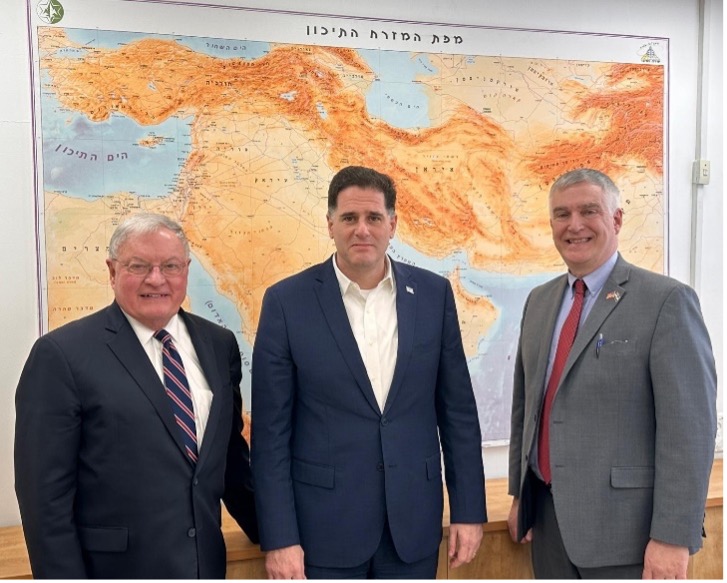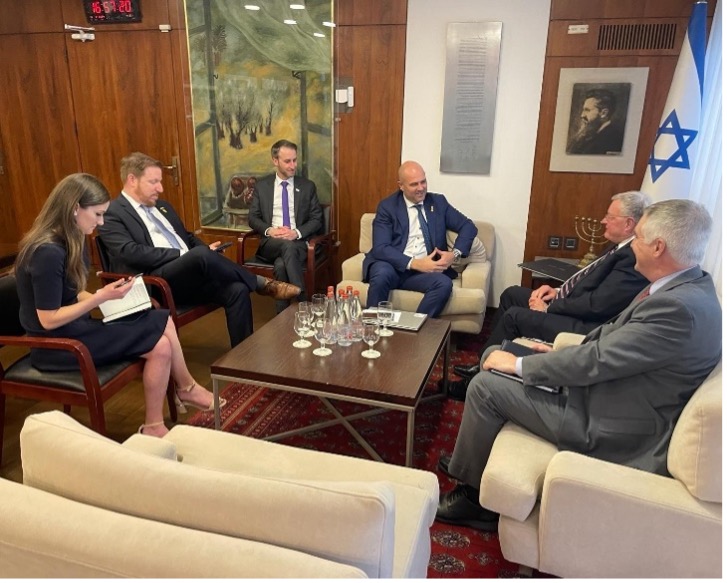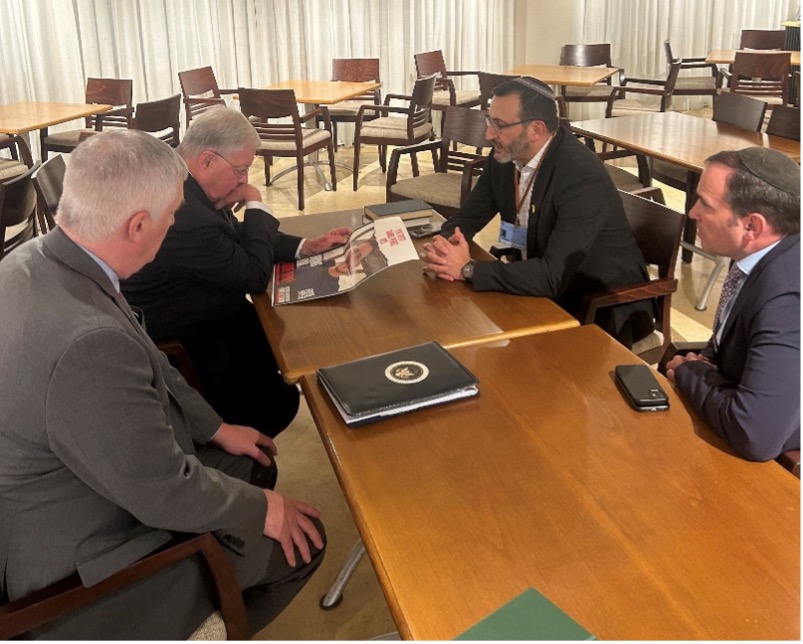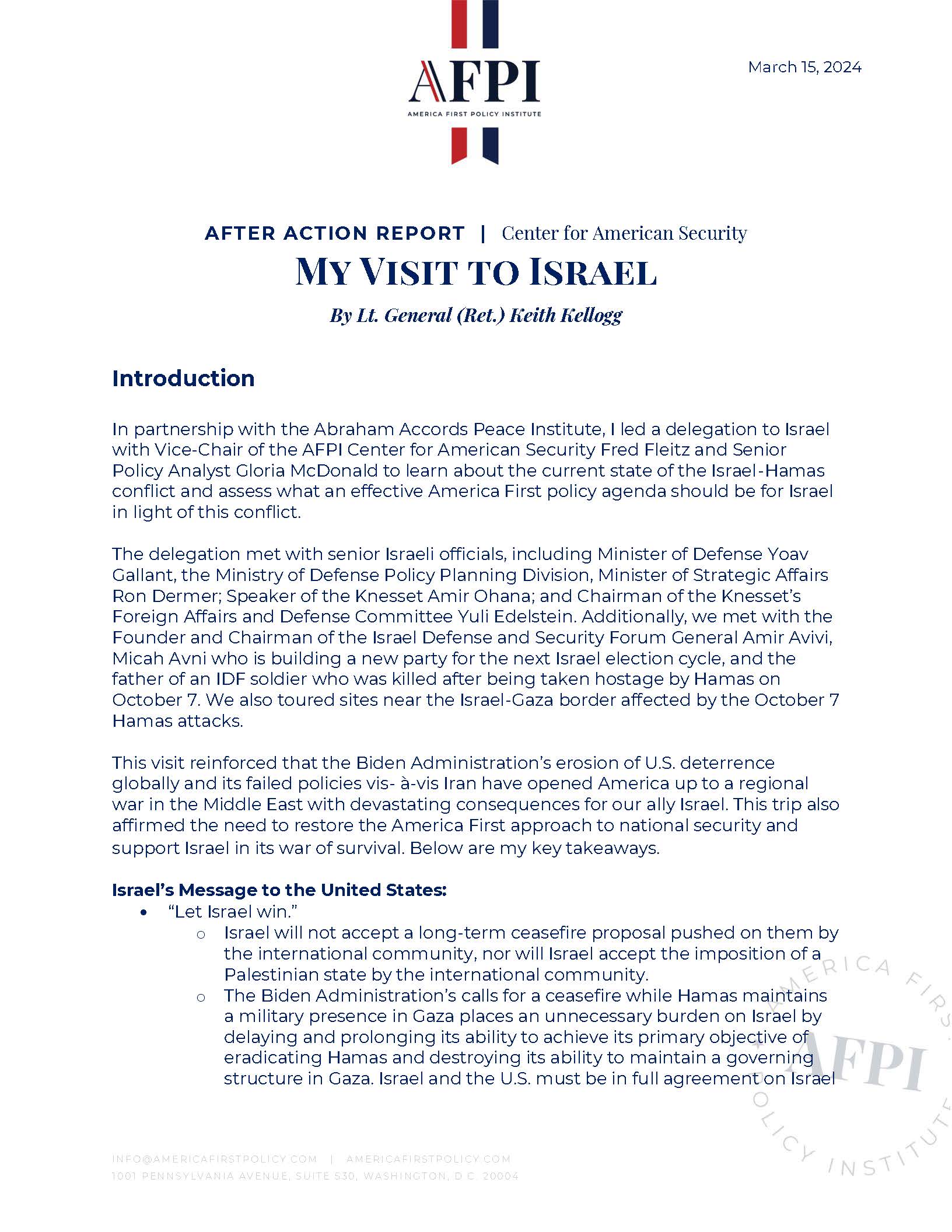My Visit to Israel
Introduction
In partnership with the Abraham Accords Peace Institute, I led a delegation to Israel with Vice-Chair of the AFPI Center for American Security Fred Fleitz and Senior Policy Analyst Gloria McDonald to learn about the current state of the Israel-Hamas conflict and assess what an effective America First policy agenda should be for Israel in light of this conflict.
The delegation met with senior Israeli officials, including Minister of Defense Yoav Gallant, the Ministry of Defense Policy Planning Division, Minister of Strategic Affairs Ron Dermer; Speaker of the Knesset Amir Ohana; and Chairman of the Knesset’s Foreign Affairs and Defense Committee Yuli Edelstein. Additionally, we met with the Founder and Chairman of the Israel Defense and Security Forum General Amir Avivi, Micah Avni who is building a new party for the next Israel election cycle, and the father of an IDF soldier who was killed after being taken hostage by Hamas on October 7. We also toured sites near the Israel-Gaza border affected by the October 7 Hamas attacks.
This visit reinforced that the Biden Administration’s erosion of U.S. deterrence globally and its failed policies vis- à-vis Iran have opened America up to a regional war in the Middle East with devastating consequences for our ally Israel. This trip also affirmed the need to restore the America First approach to national security and support Israel in its war of survival. Below are my key takeaways.
Israel’s Message to the United States:
- “Let Israel win.”
- Israel will not accept a long-term ceasefire proposal pushed on them by the international community, nor will Israel accept the imposition of a Palestinian state by the international community.
- The Biden Administration’s calls for a ceasefire while Hamas maintains a military presence in Gaza places an unnecessary burden on Israel by delaying and prolonging its ability to achieve its primary objective of eradicating Hamas and destroying its ability to maintain a governing structure in Gaza. Israel and the U.S. must be in full agreement on Israel pursuing this goal.
- Give Israel the tools it needs to win.
- In the short term, Israel is in the most need of U.S. aviation platforms and ammunition to achieve its goal of eliminating Hamas in Gaza.
- Israel is also in need of continued diplomatic support from the U.S. as more international pressure is placed on Israel to accept a ceasefire.
- Israel’s ability to win this war serves U.S. interests as it reestablishes credible American deterrence, which will impact the war in Ukraine and America’s ability to address the rising threat of China.
The Current State of the War:
- In four months of ground action, the IDF has taken out 18 of the 24 battalions of Hamas militants. Four Hamas battalions remain in Rafah, and the other two battalions are in the center camps of Gaza.
- Israel’s priority is to pivot to the south and eliminate the four Hamas battalions currently in Rafah, comprised of 8,000–10,000 Hamas militants. The IDF has confidence that once Israel makes it into Rafah, the war is weeks away from being completed.
- One hundred and thirty-four hostages remain in captivity by Hamas. Hamas is using the hostages to pressure Israel into accepting a ceasefire proposal and stop the war before it defeats Hamas.
- More than 1.2 million people have been displaced from their homes because of this war.
Defining Victory: Israel’s Primary War Objectives:
- Eliminate the governing and organizational structure of Hamas as a military force in Gaza.
- While it may be impossible to eliminate every individual Hamas militant, eradicating all 24 Hamas battalions and eliminating Hamas leadership cripples Hamas’s ability to reorganize as a force structure. Moreover, eliminating Hamas’s leadership enables Israel to enact a surrender structure for any remaining Hamas militants.
- Secure the release of the 134 hostages.
- Achieve full freedom of operation and security control for Israel over Gaza.
- Strengthen U.S.-Israel relations amidst increased international pressure on Israel.
- Secure Israel’s Borders.
- Israel’s northern and southern borders remain key vulnerability points in Israel’s security.
- Hezbollah operatives are active along Israel’s northern border, and as long as Israel’s border with Egypt remains open, Israel is vulnerable to exploitation by Hamas utilizing the underground tunnel networks to reenter Gaza.
- Israel’s goal is to change the security reality along Israel’s northern border by pushing Hezbollah further back from Israel’s territory and securing its border with Egypt.
Israel’s Post-Victory Objectives:
- Reconstruct Gaza in such a way that Israel’s long-term security is ensured.
- Israel and the U.S. need to enact long-term, generational changes for the deradicalization of all Palestinians in Gaza and the West Bank. This should include making all investments into the reconstruction of the Gaza continent upon Palestinians enacting deradicalization reforms in its media, schools, mosques, and other educational and cultural institutions.
- Implement a security architecture in which Israel has full freedom of operation and security control over Gaza. Israel cannot simply defeat Hamas in Gaza and then withdraw without the expectation that Hamas will return to recapture territory.
- In the short term, some form of military governance by Israel will be needed to prevent Hamas from reestablishing itself as the governing authority in Gaza.
- In the long term, Israel will need assistance from the U.S. to implement deradicalization policies with the Palestinians.
- Restart the normalization and peace process between Israel and its Arab-nation neighbors.
- Once Israel achieves its primary war objective of eliminating Hamas’s force structure in Gaza, Israel will need strong leadership from the U.S. to resume the Abraham Accords and the normalization of relations between Israel and its neighbors.
The Role of Iran’s Proxy Forces in the Israel War:
- Israeli officials repeatedly stated that Iran was behind the October 7 terrorist attack and that Iran continues to undermine regional security and threaten U.S. forces through its terrorist proxies.
- Hamas, an Iranian proxy, gained a tactical advantage on October 7 when it was able to launch a devastating surprise attack on Israel. However, Hamas made a strategic error by assuming Hezbollah and other Iranian proxies would enter into the fight in a more significant manner.
- Hezbollah has largely constrained itself in this war by launching only limited attacks along the northern border of Israel. While Hezbollah has launched these attacks in order to stretch Israel’s forces thinly by opening up a new front to the war in the north, Hezbollah will ultimately not sacrifice itself for Hamas. Moreover, Hezbollah will also not risk bringing Lebanon into a full-scale war with Israel just for the purpose of supporting Hamas.
The Impact of U.S. Deterrence in the Region:
- The message from Israeli officials was clear that credible U.S. deterrence matters for this region. Iran and its proxies respond to strong U.S. leadership and have repeatedly demonstrated that when the U.S. responds to Iran with strength and resolve, Iran and its proxy forces are deterred from taking further hostile actions.
- The credible deterrence against Iran that was implemented in the Trump Administration through its decisive military actions, such as the assassination of Soleimani and its maximum pressure campaign, enabled peace in the region and thwarted Iran.
The End of the Two-State Solution:
- Pushing a two-state solution in the wake of the October 7 attacks has severe long-term negative consequences, as it signals that there is a reward for Hamas’s violence and atrocities committed on October 7. Israeli officials do not appreciate the U.S. trying to force a two-state solution peace plan on Israel that they have rejected. One Israeli official objected to first hearing about new U.S. peace plans in the press rather than a U.S. official directly.
- The two-state solution is dead until the Palestinians undergo deradicalization. Israeli officials stated that Israel can no longer agree to any long-term peace agreement with an enemy that teaches their children from kindergarten to kill Jews and to destroy the State of Israel. Deradicalization may take a generation to complete.
- The deeply corrupt and anti-Israel Palestinian Authority has demonstrated that it does not possess the capability to govern Gaza. Because of this, Israel must be given full security control over Gaza until another arrangement can be found to govern Gaza that does not endanger Israeli security.
America first Stands with Israel




